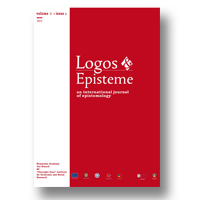|
articles |
|
41.
|
Logos & Episteme:
Volume >
4 >
Issue: 1
Travis Timmerman
The Persistent Problem of the Lottery Paradox: And its Unwelcome Consequences for Contextualism
abstract |
view |
rights & permissions
| cited by
This paper attempts to show that contextualism cannot adequately handle all versions of ‘The Lottery Paradox.” Although the application of contextualist rules ismeant to vindicate the intuitive distinction between cases of knowledge and nonknowledge, it fails to do so when applied to certain versions of “The Lottery Paradox.” In making my argument, I first briefly explain why this issue should be of central importance for contextualism. I then review Lewis’ contextualism before offering my argument that the lottery paradox persists on all contextualist accounts. Although I argue that the contextualist does not fare well, hope nevertheless remains. For, on Lewis’ behalf, I offer what I take to be the best solution for the contextualist and argue that once this solution is adopted, contextualism will be in a better position to handle the lottery paradox than any other substantive epistemological theory.
|
|
|
|
|
debate |
|
42.
|
Logos & Episteme:
Volume >
4 >
Issue: 1
Thomas Kroedel
The Permissibility Solution to the Lottery Paradox – Reply to Littlejohn
abstract |
view |
rights & permissions
| cited by
According to the permissibility solution to the lottery paradox, the paradox can be solved if we conceive of epistemic justification as a species of permissibility.Clayton Littlejohn has objected that the permissibility solution draws on a sufficient condition for permissible belief that has implausible consequences and that the solution conflicts with our lack of knowledge that a given lottery ticket will lose. The paper defends the permissibility solution against Littlejohn’s objections.
|
|
|
|
|
43.
|
Logos & Episteme:
Volume >
4 >
Issue: 1
Michele Palmira
On the Necessity of the Evidential Equality Condition for Epistemic Peerage
abstract |
view |
rights & permissions
| cited by
A popular definition of epistemic peerage maintains that two subjects are epistemic peers if and only if they are equals with respect to general epistemic virtuesand share the same evidence about the targeted issue. In this paper I shall take up the challenge of defending the necessity of the evidential equality condition for a definition of epistemic peerage from criticisms that can be elicited from the literature on peer disagreement. The paper discusses two definitions that drop this condition and argues that they yield implausible verdicts about the instantiation of the epistemic peerage relation.
|
|
|
|
|
44.
|
Logos & Episteme:
Volume >
4 >
Issue: 1
Joshua A. Smith, Adam C. Podlaskowski
Infinitism and Agents Like Us: Reply to Turri
abstract |
view |
rights & permissions
| cited by
In a recent paper, “Infinitism and Epistemic Normativity,” we have problematized the relationship between infinitism and epistemic normativity.Responding to our criticisms, John Turri has offered a defense of infinitism. In this paper, we argue that Turri’s defense fails, leaving infinitism vulnerable to the originally raised objections.
|
|
|
|
|
|
|
45.
|
Logos & Episteme:
Volume >
4 >
Issue: 1
Notes on the Contributors
view |
rights & permissions
| cited by
|
|
|
|
|
|
|
46.
|
Logos & Episteme:
Volume >
4 >
Issue: 1
Logos & Episteme. Aims and Scope
view |
rights & permissions
| cited by
|
|
|
|
|
|
|
47.
|
Logos & Episteme:
Volume >
4 >
Issue: 1
Notes to Contributors
view |
rights & permissions
| cited by
|
|
|
|
